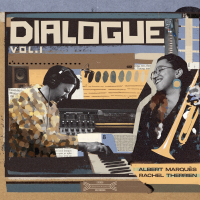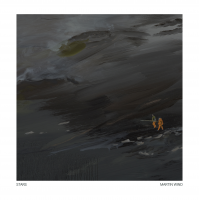Home » Jazz Articles » Extended Analysis » King Crimson: Islands (40th Anniversary Series)
King Crimson: Islands (40th Anniversary Series)
While each reissue sheds new light on the group's development—and a revolving door policy that saw the group run through members like water in its first couple years—certain releases are particularly key, particularly memorable and special revelations, as the result of Wilson's unparalleled efforts at retaining the full intent of the music, while adding greater transparency and clarity. Lizard (1970), for example, was an album that Fripp himself had little time for back in the day, until Wilson almost single-handedly reinvigorated/reinvented it, making it sound as it always should have.
The fundamental reason for Wilson's ability to bring further three-dimensionality and reveal previously hidden detail is, in no small part, due to his working, not just with the original master tapes, or the original eight-track tape, but with the many multi-track reels that were "bounced down" during the original recording process, to a mere eight tracks—a technological limitation of the time that unavoidably lost sound with each bounce down, due to tape transfer loss. If a group wanted to record more than eight discrete tracks—often, for example, using as many as eight tracks just for the drums alone—bouncing down was a necessary evil, until the advent of 16-, 24-and 32-track recorders. This means that previous Crimson reissues were dealing with the same significant signal loss by working with the original master, culled from an eight-track tape, the result of significant bounce downs from other tape reels.
Having access to all the original, pre-bounce down tracks means that Wilson can remix Crimson's catalog with greater attention to separation, depth and clarity. For those who consider these 40th Anniversary Series reissues to be nothing more than a money grab, Panegyric head Declan Coglan's insightful article, "The Course of the Crimson King: King Crimson & The Record Industry 1969-2009"—published in the six-disc In the Court of the Crimson King set and in need of greater exposure outside the purview of that limited edition box—clarifies that few of the many CD issues of Crimson's catalog have been made with the permission of the artists; Fripp's long and expensive battle to regain the rights to Crimson's music has been legendary in the music industry, and while the 30th Anniversary editions of a decade ago were made with the best technology available at the time, this new 40th Anniversary Series is truly definitive; it's hard to imagine any subsequent technological advancements that could surpass the sound of both these CDs and DVD audio discs, so thorough and meticulous has the care been given to bring this music to new life.
And so, to Islands, King Crimson's fourth release (1971), and the first to feature a road-capable band after the short-lived original line-up of In the Court of the Crimson King and, with the possible exception of Lizard, the most overtly jazz-centric album in the group's career. Back from In the Wake of Poseidon (1970) and Lizard was Mel Collins, a flautist, saxophonist and, in concert, second mellotronist, who surpassed founding member Ian McDonald as a capable improviser. Crimson always was—and has remained—an improvising band, taking considerable risks live, as dozens of King Crimson Collectors Club releases have supported; but at this point the group was also more instrumentally expansive, with Fripp inviting some of the cream of the British jazz scene to participate on albums beginning with In the Wake of Poseidon and, largely, ending with Islands. In particular, pianist Keith Tippett brought a sense of reckless abandon to Crimson circa 1970-71, and while he contributes less to Islands than he does to the previous two releases, the album's poignant, pastoral title track, in particular, may be the most unabashedly beautiful music the usually outré pianist has ever played.
Much has been written about Fripp's recruitment of a new singer for the group, and how he actually taught him how to play bass, but Raymond "Boz" Burrell—who would go on to much greater fame as a member of Bad Company—would never again sing more beautifully than he did on Islands. An early sign of raunchier things to come can be heard on the album's closest thing to rock—albeit with shifting bar lines making "find the one" a challenge—"Ladies of the Road," Crimson wordsmith Peter Sinfield's paean to groupies, and an uncharacteristically unflowery set of lyrics. But elsewhere, Boz's schooled voice, soft and with an appealing vibrato, has less to do with rock and more to do with classical/choir training on the opening "Formentera Lady" and closing title track.
Drummer Ian Wallace—recently deceased, his last project actually being the Crimson Jazz Trio, which performed jazz arrangements of songs from Crimson stretching from In the Court of the Crimson King to its third-to-last incarnation, the double trio of Thrak (DGM Live, 1995)—was already a busy player in groups like the Warriors (with a pre-Yes Jon Anderson) and Neil Innes' World and , when Fripp recruited him for Islands. Fripp couldn't have found made a better choice; he may have been working largely in rock bands, and could play with all the prerequisite weight and groove on tracks like "Ladies of the Road" and the more melodramatic "The Letters," which leaps from a whisper to a roar; but equally, Wallace had a feel for the Fripp's jazz proclivities, making the first half of "The Sailor's Tale"—a segue from "Formentera Lady" that totals nearly 18 of some of Crimson's finest minutes ever—swing in ways that Lizard's Andy McCulloch simply never could.
While Fripp had already established himself as a guitarist worth watching from the get-go of In the Court of the Crimson King—even earlier, in fact, on the inconsistent but occasionally brilliant pre-Crim The Cheerful Insanity of Giles, Giles & Fripp (Deram, 1968)—on Crimson's first four records he was more focused on group sound, rarely soloing, though his stunning break on In the Court of the Crimson King's iconic and often-requested opener, "21st Century Schizoid Man," remains a defining moment in rock history. His acoustic guitar work on "Formentera Lady," which opens with guest bassist Harry Miller's rich arco and Collins' fleet flute work, may be largely buried in the mix, but its tasteful, harmonically intriguing approach broadens what could be a simple tune but becomes, instead, with the addition of Tippett, and soprano Paulina Lucas on the song's lengthy, open-ended vamp outro that segues into "Sailor's Tale," a rich tapestry of ever-shifting ideas, beautifully brought together by Wilson in this new mix. Still, it's the one-two punch of Fripp's sinewy, heavily sustained guitar lines at the start of the 6/8 pulse-driven "Sailor's Tale," and even more, his stunning chordal solo in its middle section—processed to sound like a banjo from your worst nightmare—as Fripp builds a solo that makes clear he may have been categorized by the world as a rock player, but he absolutely spoke a more sophisticated jazz vernacular.
"Prelude: Song of the Gulls" which leads to the title track, is something of an oddity in the Crimson catalog. Rather than using mellotron for the symphonic sound that had, by this time, become somewhat synonymous with the name King Crimson, this is a gentle, pastoral, neoclassical piece, using real symphonic instruments, that suggests, even more, the breadth of Fripp's reach, even at this early stage in his career. The guitarist has continued to innovate in and out of Crimson, with solo projects including his ongoing Soundscapes and collaborations with artists like David Sylvian and Brian Eno, but he's rarely demonstrated quite this expansive a reach in one relatively brief short timeframe.
As strong an album as Islands is—and it's all the more so for Wilson's astute and definitive new mix, and a remarkable DVD authoring/assembly job by Opus Productions' Neil Wilkes, fitting an incredible amount of bonus content onto the DVD, in addition to MLP Lossless 5.1 Surround, DTS 5.1 Digital Surround, MLP Lossless Stereo (24/96) and PCM Stereo 2.0 (24/48) versions of the original album and/or 2010 remix—the nearly 90 minutes of bonus material makes this 40th Anniversary Series edition even more special and more definitive. Additional mixes and takes of the album's tracks allow Fripp to create, as he did on In the Court of the Crimson King, an "Alternate Version" of the album (also available as bonus tracks on the CD), and there are additional multiple takes of both "Ladies of the Road" and "Formentera Lady." A segment, called "Routes to Islands" collects previously unreleased rehearsals by the Islands band, performing "Sailor's Tale" as well as a couple of earlier Crimson tracks, including In the Wake of Poseidon's hard-edged "Pictures of a City" and an early version of "The Letters," called "Drop In," that was performed as early as 1969 by the first touring Crim. There are also a couple of live tracks culled from previous King Crimson Collectors Club releases, to open a full window onto this group's development in the studio, and on the road.
But for the true Crimhead, the holy grail of this Islands reissue is a brief track (just under four minutes) called "A Peacemaking Stint Unrolls," that finds the group working out an early arrangement that combines one of the knottier segments from "Larks' Tongues in Aspic Part I," that would show up, considerably altered, a couple years later on Larks' Tongues in Aspic (DGM Live, 1973), as well as a fragment from what would become "Lament," from the 1974 follow-up, Starless and Bible Black (DGM Live), both with a totally revamped lineup. Here, rather than the jagged, distorted tone and weightier performance from future Crims, bassist John Wetton and drummer Bill Bruford, Fripp's tone is clean and warm, making this version sound like something of a cross between In the Wake of Poseidon's surprisingly free "Groon" and where Fripp was ultimately heading. With the more overt jazz-centricity of this Crim incarnation—for now, at least; soon after, with some touring under its belt, the group would polarize between Fripp's continued tendencies and the rest of the group's desire to get funky and jam, a mistake made clear with the release of the largely awful, bootleg quality Earthbound (DGM Live, 1972)—Fripp's complex, elliptical theme becomes a guitar/drums duo head that leads into freer improvisational territory when Boz and Collins join in.
Virtually every Crimson album, from Wake of Poseidon through to Islands, was transitional in some way, and this single track demonstrates that, while Fripp was able to put a period on the Islands album with its well-conceived, tremendously executed and perfectly sequenced collection of six compositions, he was always thinking ahead. It's a characteristic that kept the group moving forward in the three decades that followed—when, that is, Fripp felt that it was time for Crimson to once again emerge, invariably in a shape that could not have come out of a vacuum but was, nevertheless, significantly different than the versions that came before. Islands, like Lizard, is often overlooked in the King Crimson catalog, but like its predecessor, this 40th Anniversary Series edition makes clear just how different Crimson was, at a time when progressive rock was ruling the airwaves, the wallets of record-buying consumers, and the arenas where rock shows were taking place. And while this band would, indeed, become a hard-working touring band, the instrumentation and ambience of Islands was something that could never truly be replicated live, making this remix/reissue all the more significant.
Track Listing
CD: Formentera Lady; Sailor's Tale; The Letters; Ladies of the Road; Prelude: Song of the Gulls; Islands; Islands (studio run through with oboe prominent); Formentera Lady (Take 2); Sailor's Tale (alternate mix/edit); A Peacemaking Stint Unrolls (Previously unreleased); The Letters (Rehearsal/outtake); Ladies of the Road (Robert Fripp & David Singleton remix). DVD: MLP Lossless 5.1 Surround and DTS 5.1 Digital Surround: Formentera Lady; Sailor's Tale; The Letters; Ladies of the Road; Prelude: Song of the Gulls; Islands. MLP Lossless Stereo (24/96) and PCM Stereo 2.0 (24/48): 2010 stereo mix: Formentera Lady; Sailor's Tale; The Letters; Ladies of the Road; Prelude: Song of the Gulls; Islands. Original album: Formentera Lady; Sailor's Tale; The Letters; Ladies of the Road; Prelude: Song of the Gulls; Islands. Stereo: Islands: The Alternate Album: Formentera Lady (Take 2); Sailor's Tale (alternate mix/edit); The Letters (Rehearsal/outtake); Ladies of the Road (rough mix); A Peacemaking Stint Unrolls (Previously unreleased); Islands (studio run through with oboe prominent). ). Route to Islands: Pictures of a City (Islands lineup rehearsal); Sailor's Tale (Islands lineup rehearsal); Islands (fragment: Robert Fripp reference cassette—mellotron on vibes setting); Formentera Lady (rough mix); Sailor's Tale (rough mix), Drop In (Early rehearsal by Islands lineup);The Letters (Live at Plymouth); Sailor's Tale (Live at the Zoom Club). Additional tracks: Assorted Ladies: Ladies of the Road (Robert Fripp & David Singleton remix); Ladies of the Road (Take 5); Ladies of the Road (Take 1); Ladies of the Road (Take 3); Ladies of the Road (Take 4).
Personnel
King Crimson
band / ensemble / orchestraRobert Fripp: guitar, mellotron, Peter's pedal harmonium, sundry implements; Mel Collins: flutes, bass flute, saxophones, vocals; Boz: bass guitar, lead vocals, choreography; Ian Wallace: drums, percussion, vocals; Peter Sinfield: words, sounds, visions; Robin Miller: oboe; Mark Charig: cornet; Keith Tippett: piano; Paulina Lucas: soprano; Harry Miller: string bass.
Album information
Title: Islands (40th Anniversary Series) | Year Released: 2010 | Record Label: Panegyric Recordings
Tags
About King Crimson
Instrument: Band / ensemble / orchestra
PREVIOUS / NEXT
Support All About Jazz
 All About Jazz has been a pillar of jazz since 1995, championing it as an art form and, more importantly, supporting the musicians who make it. Our enduring commitment has made "AAJ" one of the most culturally important websites of its kind, read by hundreds of thousands of fans, musicians and industry figures every month.
All About Jazz has been a pillar of jazz since 1995, championing it as an art form and, more importantly, supporting the musicians who make it. Our enduring commitment has made "AAJ" one of the most culturally important websites of its kind, read by hundreds of thousands of fans, musicians and industry figures every month.






















